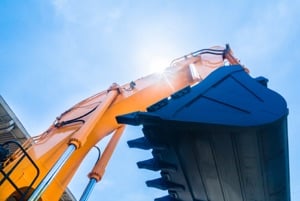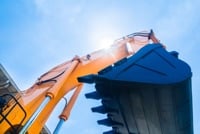 Imagine trying to complete a major construction project without the use of heavy equipment like cranes and backhoes. You probably can’t. Almost every construction site includes at least a few pieces of heavy equipment to help complete the job.
Imagine trying to complete a major construction project without the use of heavy equipment like cranes and backhoes. You probably can’t. Almost every construction site includes at least a few pieces of heavy equipment to help complete the job. Heavy equipment is one of the biggest hazards for construction workers and it causes hundreds of injuries and deaths every year, thereby increasing contractor insurance costs and affecting employee productivity and morale.
A Leading Cause of Fatalities
According to the Work Safe Center, “machine-related injuries ranked second after motor vehicle-related injuries among the leading causes of occupational injury fatalities.” Construction workers and heavy equipment operators accounted for 63% of heavy equipment and truck-related deaths. Half the deaths involved backhoes and trucks.Rollovers accounted for the most deaths for heavy equipment operators. The most significant cause of death for workers on foot and maintenance workers is being struck by heavy equipment or trucks. Being caught in or between was also a common cause of injuries for people working on or near heavy equipment.
3 Tips to Help You Focus on Safety
A focus on worksite safety can help protect your employees, your business, and your bottom line. Here are three heavy equipment safety tips to decrease injuries and deaths and decrease insurance costs.1 - Training
OSHA requires that anyone operating heavy equipment be thoroughly trained on how to properly and safely operate heavy equipment. This training should be a combination of hands-on and classroom instruction and should include how to identify hazards, safety features on the equipment, load capacity, how to get in and out of equipment safely, and how to safely maneuver the equipment.
And training should be ongoing.
2 - Awareness
Unfortunately, the very prevalence of heavy equipment on job sites often causes workers to become complacent, but it’s crucial that anyone operating or working around heavy equipment be mindful of what is going on around them. That includes overhead power lines (which should be deenergized if possible) and underground sewer, water, gas, and electric.
Heavy equipment operators should be aware of the swing radius of the equipment they’re operating to avoid hitting people and other equipment, especially when working in tight spaces.
Whenever possible, the area where heavy equipment is being used should be cordoned off, and workers should always try to stay away from areas where heavy equipment is being operated. If that isn’t possible, use a spotter and a radio to keep blind spots clear.
3 - Use Equipment Properly
Before operating any heavy equipment, workers should visually inspect the equipment to make sure it is in good operating condition including tires and tracks, fluid levels, hydraulic hoses, buckets, booms, and any attachments. Make sure lights, gauges, horns, and alarms are working, and that arms, buckets, shovels, etc. can fully extend. If the cab rotates, make sure it does so correctly in all directions. Workers should never use equipment that doesn’t operate correctly or appears to be damaged.
Equipment should only be used for the task it was designed for, and operators should be aware of the payload and lift capacity of the equipment and not overwork it.
Workers should know how to enter and exit equipment. Similar to climbing a ladder, operators should not carry anything as they climb onto equipment and should maintain three points of contact. Before entering or exiting equipment, make sure it is completely shut off, the parking brake is engaged, and pressure is released from hydraulic controls. Workers should never enter or exit equipment while it is in operation or while it is moving.
And finally, there is a reason the equipment is equipped with a seatbelt. If a piece of heavy equipment tips or rolls over, the seatbelt could save a life. One of the worst things a worker can do if the equipment begins to tip or rollover is to jump out of it even though that may be their first instinct. Staying inside with your seatbelt on is your safest option.
The Right Insurance – Your Last Line of Defense
 Preventing workplace injuries and deaths should always be your first line of defense. Unfortunately, sometimes despite all of your efforts, accidents do happen. That’s where the right insurance can help protect you and your employees!
Preventing workplace injuries and deaths should always be your first line of defense. Unfortunately, sometimes despite all of your efforts, accidents do happen. That’s where the right insurance can help protect you and your employees!
Give American Insuring Group a call at (800) 947-1270 or (610) 775-3848 or find us online.
We’re experts in contractor insurance. We know the risks you face and offer affordable rates on contractor insurance by analyzing the plans and comparing insurance costs from many competing insurance carriers!
The result? You get quality contactor insurance at the best rate possible. Contact us today to learn more!







